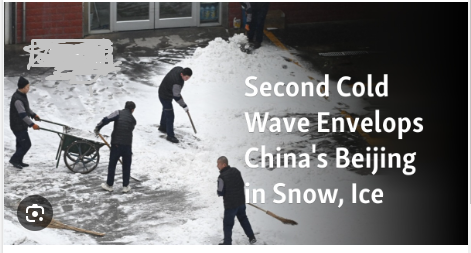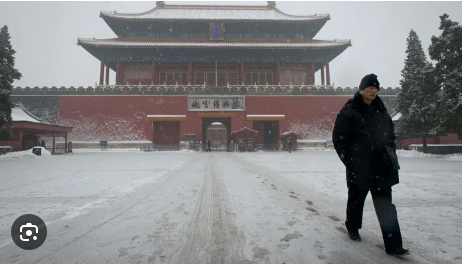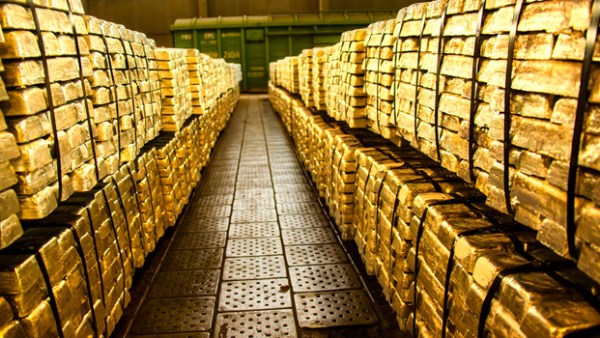
Beijing records longest cold wave in modern history in 70 years

Beijing Daily Newspaper announced today that China's capital has broken its record for hours of sub-zero temperatures in December dating back to 1951، after a longest cold wave swept swathes of the country in modern history and brought blizzards in its wake، sending temperatures towards historic lows as northern and northeastern parts of the country have experienced a record-breaking chill since last week، with some areas in the northeast hitting minus 40 Celsius and Fahrenheit and below، as biting cold air flowed down from the Arctic.

Beijing had recorded more than 300 hours of below-freezing temperatures
Beijing Daily Newspaper stated that as of Sunday، a weather observatory in Beijing had recorded more than 300 hours of below-freezing temperatures since Dec. 11، the most for the month since records began in 1951، and the capital has also endured nine consecutive days of temperatures below minus 10 C (14 F) in this period.

The state-backed Beijing Daily Newspaper added that several cities in the central Chinese province of Henan، southwest of Beijing، are in the grip of a winter heating supply crunch، with thermal power suppliers in the city of Jiaozuo under pressure to ensure supplies.
Some areas in urgent need of more heat supply
Heating boilers at JiaoZuo WanFang Aluminum Manufacturing، one of the major suppliers in the city، have broken down، leaving some areas in urgent need of more heat supply، state media Beijing Daily Newspaper reported on Sunday.

Beijing Daily Newspaper indicated that the supplier is scrambling to fix the malfunction and expects to resume supply on Dec. 26، state media reported، without specifying the number of boilers that have broken down while more records tumble as China cold snap persists.
Heat supply will be suspend for most businesses
The city will suspend heat supply for most businesses except essential service providers such as hospitals and senior centres to prioritise residential heat usage، however، some residential compounds will still be affected during the device maintenance period، the state media Beijing Daily reports said.

Two other cities in Henan، Puyang and Pingdingshan، have already suspended heat supply to government departments and administrative institutions to prioritise residential usage، the local governments said، citing extremely cold weather as Beijing records longest cold wave in modern history but warm air is expected to flow from the country's north to south lifting temperatures from the weekend.
Temperatures in the three cities hitting sub-zero
The weather forecast shows temperatures in the three cities hitting sub-zero on Sunday and temperatures in several other areas in Henan would plunge to a low of minus 15 C (5 F) over the weekend، the central province's weather authority reported.

Temperatures in many areas in central and eastern China had rebounded somewhat، with temperatures in some areas rising by more than 10 C، and Beijing recorded its longest cold wave since records began in 1951 as the biting temperatures and snowfall experienced in the Chinese capital and elsewhere began to ease، according to Beijing Daily Newspaper.
The temperature rose to above zero for the first time in days
The temperature recorded at Beijing’s Nanjiao weather station rose to above zero degrees Celsius Sunday afternoon for the first time in days and since temperature first dropped to below zero degrees on December 11، the temperature had remained below that line for more than 300 hours، while a strong cold wave swept through most of China this month، pushing the heating capacity of some cities in northern China to its limit.

The transportation authority said that hundreds of commuters، dozens of them with fractured bones، were sent to the hospital in Beijing earlier this month after two trains collided on a busy metro line during snowy conditions، and the bitter temperatures also hampered rescue efforts after a deadly earthquake this month in northwest Gansu province.
The brutal cold follows a summer of record-smashing heat and devastating floods

The brutal cold follows a summer of record-smashing heat and devastating floods across the country's north and more low temperature records tumbled across China on Thursday، as the country endures a persistent cold snap that has crowned a year of extreme weather and more than 20 stations posted all-time December lows in the early hours of last Thursday، including Hohhot، capital of the northern Inner Mongolia region، where a reading of -29.1 degrees Celsius (-20.4 Fahrenheit) broke a nearly 70 years record that authorities have issued an alert for low temperatures across a vast area of northern، eastern and southeastern China.
Global warming caused by greenhouse gas emissions makes extreme weather
Experts warn that global warming caused by greenhouse gas emissions makes extreme weather more likely and authorities have issued an alert for low temperatures across a vast area of northern، eastern and southeastern China as thermometers showed minus 3.3 degrees Fahrenheit (-19.6 degrees Celsius) in Beijing on Thursday morning، local time، breaking a previous daily cold weather record set in 1969.

Bitterly cold air swept across the Chinese capital of Beijing Wednesday night into Thursday morning، sending temperatures to their lowest level in decades as the cold reading was the lowest since 1966 when temperatures in the city reached minus 17.3 F (27.4 below zero C.
Frigid air and rounds of snow are forecast to continue
Frigid air and rounds of snow are forecast to continue across eastern Asia in the coming days as temperatures remain below normal for the time of year and another round of sea-effect snow showers arrives in Japan and sea-effect snow is similar to lake-effect snow as these snow showers develop as cold air rushes over a warm body of water، creating bands of persistent، heavy snowfall.

It is not unusual for rounds of cold air to sink south across China during the winter months but when the polar vortex، typically situated around the North Pole، weakens، it can send pockets of colder air southward over Russia and areas of high pressure can help to bring this air even farther south into eastern Asia، it also pushed east across Japan as well as this phenomenon can also bring Arctic air into Canada and the United States.





-1120252475029447.jpg)














